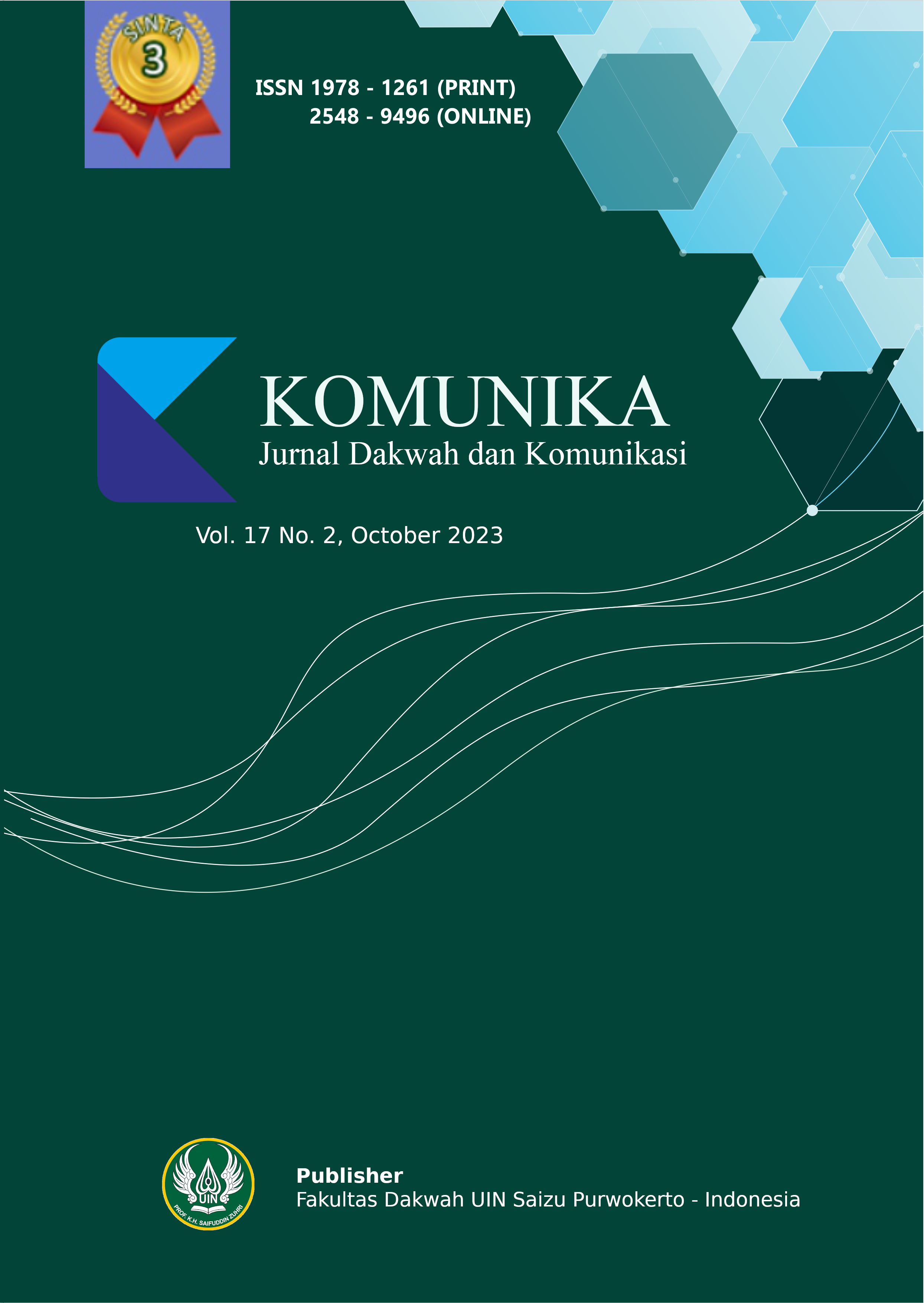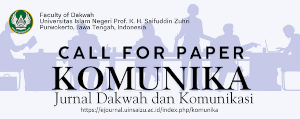Islamic-Politics Da'wah in Abdurrahman Wahid's Pluralism Concept According to Non-Muslim Minorities Perspective in Meranti Islands Regency, Riau Province, Indonesia
DOI:
https://doi.org/10.24090/komunika.v17i2.7719Keywords:
Da’wah, Pluralism, Abdurrahman Wahid, non-muslim minoritiesAbstract
In the ethnically diverse nation of Indonesia, conflicts rooted in issues of Ethnicity, Religion, Race, and Inter-Group (SARA) have long been a persistent problem, particularly affecting ethnic Chinese who have faced marginalization and sociocultural challenges, including name changes and stereotypes. The Meranti Islands have been in the spotlight of the national media several times because of the various conflicts that occurred, both political conflicts and conflicts between ethnicities, tribes and even religions such as the burning of Chinese Ethnic Shophouses. These conflicts, driven by differences in interests and interference among groups, have sometimes led to tensions, discrimination, and even riots. The research aims to analyze Abdurrahman Wahid's political da'wah from the perspective of non-Muslim minority groups in the Meranti Islands Regency. This research is field research type. The research method uses qualitative methods. Data was collected through questionnaires and interviews and strengthened by a literature review. The research results show two thoughts regarding Islamic politics; first, 85% of the non-Muslim community in Meranty Island strongly supports Abdurrahman Wahid's Islamic political da'wah to be realized in public policies. The non-Muslim minority groups support Abdurrahman Wahid's political da'wah to maintain the Islamic taught about the rights and obligations of citizens and protect minority groups. With a percentage of 93%, they considered Abdurrahman Wahid to have carried out the function of Islamic teachings to do good deeds in a moderate and tolerant humanitarian and political life.Downloads
References
Abidin, Z. (2012). Pemikiran Abdurrahman Wahid Tentang Islam dan Pluralitas. Humaniora, 3(2), 373–386. https://doi.org/10.21512/HUMANIORA.V3I2.3332
Baharun, H. (2020). Pendidikan Multikultural dalam Bingkai Islam Nusantara Perspektif KH. Said Aqil Siroj. Tafaqquh: Jurnal Penelitian Dan Kajian Keislaman, 8(1), 37–51.
Bruinessen, M. Van. (2013). Rakyat Kecil Islam Dan Politik (Cetakan I, Issue, pp. 1–503). Penerbit Gading.
Fadhil, A. (2007). Transformasi Pendidikan Islam Di Minangkabau. Jurnal Sejarah Lontar, 4(2), 42–56. http://journal.unj.ac.id/unj/index.php/lontar/article/view/2385
Ghozali, I. (2020a). Aliran Pemikiran Politik Islam Indonesia; Muhammadiyah dan NU Vs FPI dan HTI. Al-Qalam, 37(1), 27–48.
Ghozali, I. (2020b). Memahami Format Demokrasi Model Khawarij di Indonesia. Islamadina : Jurnal Pemikiran Islam, 21(1), 17–25. https://doi.org/10.30595/ISLAMADINA.V0I0.6128
Ghozali, I., & Junaidi. (2020). Political And Nationalism Of Gp Ansor In Facing The Persecution Of Kirab Satu Negeri In The Meranti. Al-Tahrir, 20(2), 307–328.
Hakim, L., Umat, K., & Ahmad, H. A. (2011). Kerukunan dan pluralitas dalam tantangan: Vol. X.
Putra, A. E. (2019). Tarik-Ulur Antara Radikalisme Dan Multikulturalisme Dalam Studi Agama Di Abad Ke 21. Al-Adyan, 14(1), 1–18.
Sarjana, I. P. (2019). Peranan Pura Dalam Meningkatkan Pendidikan Moral Dan Ketrampilan. Videa Wertta, 2(April), 10–27.
Sholikhah, Sitti Rahmatus, T. S. (2017). Penggambaran Karakter Buddha di dalam Film Saint Oniisan. Japanology, 5(1), 1–10.
Simon, J. (2013). Tuhan Tidak Perlu Dibela: Konteks Kekerasan dan Upaya Membangun Jembatan Etis-Praktis Berteologi Agama-Agama Dalam Masyarakat Pluralistik Indonesia. Gema Teologi, 36(1), 69–94.
Ikeda, A. W. dan D. (2000). Dialog Peradaban untuk Toleransi dan Perdamaian (pp. 1–310). PT. Gramedia Pustaka Utama.
Khamdan, M. (2016). Penanganan Potensi Radikalisme. 10(1), 207–232.
M.Supian. (2016). Ajaran Dan Ritual Tiga Agama Dalam Tradisi Orang Tionghoa.
Moleong J. Lexy. (1988). Metodologi Penelitian Kualitatif. PT. Rosdakarya.
Permana, B. (2018). Etnis Tionghoa Pada Masa Orde Baru : Studi Atas Tragedi Kemanusiaan Etnis Tionghoa Di Jakarta (1998). In UIN Syarif Hidayatullah Jakarta.
Pulungan, J. S. (1994). Prinsip-Prinsip Pemerintahan dalam Piagam Madinah Ditinjau dari Pandangan Al-Qur’an (pp. 1–273). PT. Rajagrafindo Persada.
Tutik, T. T. (2005). Pokok-Pokok Hukum Tatanegara (pp. 78–80). Prestasi Pustaka.
Wahid, A. (2001). Sekadar Mendahului Bunga Rampai Kata Pengantar (T. A. S.Siswowiharjo (Ed.); pp. 1–342). Nuansa.
Downloads
Published
Issue
Section
License
Copyright (c) 2023 Imam Ghozali, Kamiluddin, Nursal Efendi

This work is licensed under a Creative Commons Attribution-ShareAlike 4.0 International License.
Authors who publish with this journal agree to the following terms:
- Authors retain copyright and grant the journal right of first publication with the work simultaneously licensed under a Creative Commons Attribution-ShareAlike 4.0 International License that allows others to share the work with an acknowledgement of the work's authorship and initial publication in this journal.
- Authors are able to enter into separate, additional contractual arrangements for the non-exclusive distribution of the journal's published version of the work (e.g., post it to an institutional repository or publish it in a book), with an acknowledgement of its initial publication in this journal.
- Authors are permitted and encouraged to post their work online (e.g., in institutional repositories or on their website) prior to and during the submission process, as it can lead to productive exchanges, as well as earlier and greater citation of published work (See The Effect of Open Access).

























